Niece Of Belgian National Detained In Iran Locks Herself In Cage
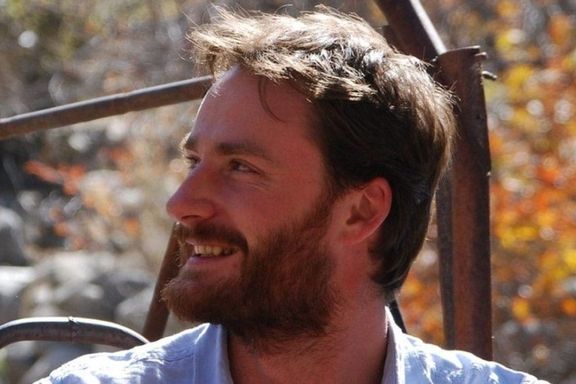
In a move to denounce the arbitrary incarceration of a Belgian aid worker in Iran, his niece locked herself in a cage in the western city of Tournai on Saturday.

In a move to denounce the arbitrary incarceration of a Belgian aid worker in Iran, his niece locked herself in a cage in the western city of Tournai on Saturday.
Olivier Vandecasteele was detained in 2022 on trumped-up charges and sentenced to 40 years in prison by the judiciary of the Islamic Republic.
He also received a sentence of 74 lashes for alleged “spying and cooperation with the United States, money laundering and currency smuggling.”
The symbolic move by Manon Vandecasteele, however, was aimed at denouncing any progress for the release of her uncle and godfather.
Approximately a hundred people gathered on the Grand Place where Manon locked herself in a small steel cage.
Putting on a white jumpsuit and a blindfold, the 19-year-old knelt on the ground while the crowd applauded.
Increasing public awareness and mobilizing the public are two objectives Manon hopes to achieve through her campaign for the release of the humanitarian worker.
Belgium and Vandecasteele’s family believe he is innocent and a victim of hostage taking by the Iranian regime.
Belgium's justice minister said in January that Vandecasteele had been imprisoned "for a fabricated series of crimes" and had been sentenced as retribution for a 20-year jail term Belgian courts imposed on Iranian diplomat Assadollah Assadi in 2021.
Assadi, 50, a former attaché at the Iranian embassy in Austria, was convicted of plotting to bomb a gathering of the exiled opposition group Mujahedin-e Khalq Organization (MEK) near Paris on June 30, 2018.
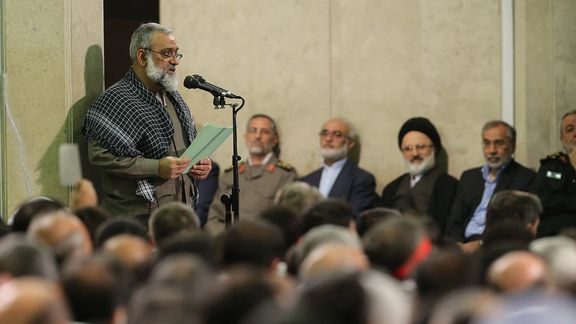
The instructor of Zionists in espionage, terror, sabotage is Satan, “this is their millennia-old profession,” a senior commander of Iran’s Revolutionary Guard says.
Gen. Mohammad-Reza Naghdi, speaking Sunday to Fars news agency controlled by the IRGC, made the anti-Semitic remark amid a torrent of daily attacks by Islamic Republic officials against Israel.
The renewed rhetoric began just a few weeks after Iran concluded an agreement with Saudi Arabia to restore diplomatic relations and according to Israeli officials, instigated attacks by Palestinians in early April.
Naghdi, who is a deputy to IRGC's chief commander, went on to say that while Satan guides the Zionists, Iran’s regime “is led by saints” and its mission is to inspire light in the hearts of men. “Some have been awakened” and even voluntarily provide top-secret information to the Islamic Republic.
“Sometimes they are shocked how the Iranians found a particular secret,” he said. “They search and search again for a spy and cannot find one, unbeknownst to them that many of their personnel are cooperating out of conviction.”
Naghdi, like many other IRGC officers, is adept at propaganda, having been raised in a religious milieu where fantastic stories are told and told again to build faith in the Shiite ideology. However, faced with multiple crises regime officials seem to have resorted more intensely to twisting reality to justify their policies or deflect criticism.
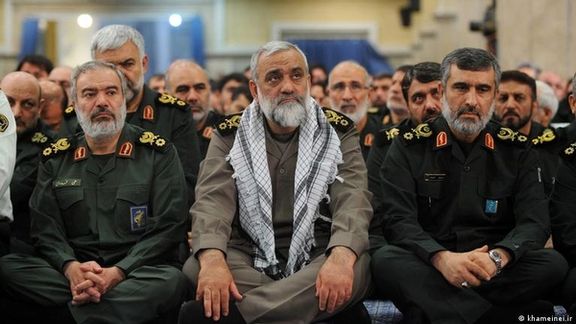
Recently, a leaked audio recording showed how an intelligence official used bizarre and conspiratorial statements in a speech to try to explain away multiple problems the regime faces.
In fact, since July 2020, evidence has piled up that Israel has deeply penetrated Iran’s security barriers and has succeeded in major sabotage operations against nuclear and military targets. The regime in Tehran and particularly the IRGC have lost face after telling the people for four decades that they are very strong in security and military spheres.
Their myth shattered, their failures in the economic sphere now loom even larger. The economy is in tatters and tens of millions of Iranians have sunk into poverty. Last year, the regime faced the most intense protests in its four-decade history, and large-scale unrest can resume at any moment.
Naghdi claimed that last year 10,000 attacks took place against Israel, taking credit for standing behind what the regime calls “the resistance front.”
“This is the revenge of the Islamic Revolution; the destruction of the Zionist regime,” he said.
Naghdi also echoed statements by other senior officials in the past few days that Israel’s power of deterrence has been broken and not only it is unable to intimidate Iran, but also it can no longer deter the Hezbollah and Palestinian militants.
He also claimed that the Islamic Republic has almost driven out the United States from the region, highlighting the US defeat in Afghanistan and the hasty withdrawal.
“They escaped from Afghanistan and most of them also escaped from Iraq and the rest will also leave. They have been defeated, and this trend will continue,” Naghdi claimed. He also mocked the US and Britain for not being able to do anything when their servicemen were detained by the Revolutionary Guard, in 2016 and 2007 respectively.
Claiming that people throughout the world follow the ideology of Iran’s regime, Naghdi asked, “In which era in history we, or any other country, had such an influence? I have estimated that daily 100,000 experts wake up, go to work, get paid in different countries just to overthrow the Islamic Republic regime…”
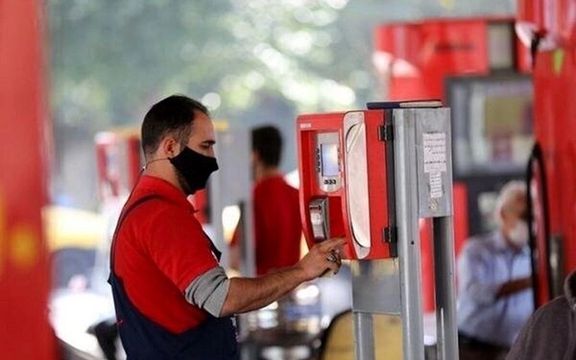
Amid nationwide strikes by workers in Iran’s energy production industry, officials have warned that the country is facing serious problems in supplying gasoline.
Hossein Aghayan, a former director of the supply department of the National Iranian Oil Refining and Distribution Company (NIORDC), says the rise in gasoline consumption is a result of heavily subsidized low prices, ILNA reported on Sunday.
The NIORDC is part of the country’s oil ministry and performs all operations relating to refining and distribution of oil products.
“One of the reasons for the growth of consumption is that the price is low. When they did not raise the price of gasoline at the right time, they should have expected its consequences,” Aghayan said, noting that if the authorities move to increase the price now, it will have a detrimental effect on an already inflation rate and will lead to increase in prices of other goods.
“If the prices are not raised, the unbridled rising consumption will continue,” Aghayan warned.
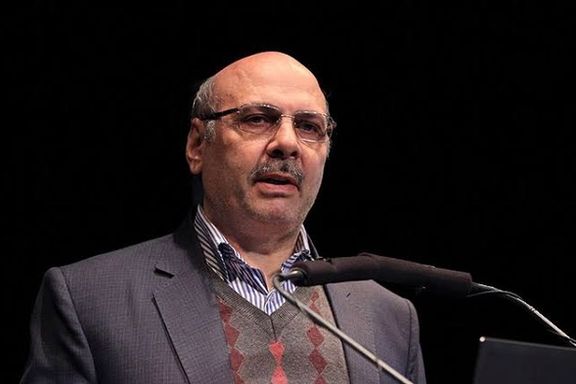
As part of a populistic approach to the economy, the Islamic Republic sells gasoline at extremely low prices, charging less than 10 US cents per gallon, or less than 3 cents per liter, while neighboring oil-producers have much higher prices, more in line with international market rates.
For years there has been talk of adjusting prices, but since 2018 Iran’s currency has dropped 12-fold and any increase needs to be very big to meaningful in US dollars.
One of the reasons that the Islamic Republic did not manage to increase fuel prices was the fear of triggering more protests, as the country was convulsed by the boldest wave of unrest following the death in custody of Mahsa Amini in September 2022.
In November 2019, a government decision to increase fuel prices by 50–200 percent triggered a cycle of protests and unrest across the country that lasted for over two weeks. During this time, angry protesters torched hundreds of gas stations, banks, and government buildings.
In March, Iran International released a classified document outlining the proceedings of a meeting of various government officials from different departments at the presidential office in late February according to which strategic fuel reserves had dropped to a dangerously low level, forcing major repairs at refineries to be delayed allowing maximum production for the time being.
The meeting decided to advise officials to avoid any public remarks or suggestions that could be interpreted as an intention to raise current fuel prices.
According to Aghayan, the main concern of the authorities at the moment is controlling the supply chain so that long lines would not form at the gas stations across the country.
He also made several suggestions on how to control the consumption of gasoline, such as stricter rationing plans and decreasing daily quotas for citizens, as well as raising fuel prices more than threefold.
“In the past, we imported super or premium gasoline and mixed it with light naphtha, and there was no problem, but if we want to supply high-quality gasoline, we have to import it,” Aghayan underlined.
In addition to extremely low prices that do not encourage saving fuel, Iran also faces gasoline and diesel shortages due to a lack of refining capacity. The low prices also lead to millions of liters of fuel being smuggled out of Iran daily, which betrays a large-scale smuggling network.
The NIORDC head, Jalil Salari, said on Saturday that about 10 million liters of diesel fuel is smuggled out of the country per day, claiming that it is about 10 percent of the country’s total daily production.
Iran has one of the biggest reserves of oil and natural gas and its economy is chiefly dependent on the revenues from crude oil exports. But due to sanctions and mismanagement it has failed to modernize the energy sector in general, with power shortages most of the year.
Systematic corruption is not something new in Iran's oil-dependent economy but recently criticism is intensifying over the government’s energy management. The situation has been grave in the past several years but since the administration of Ebrahim Raisi assumed office in 2021, the entire energy management system is going haywire even faster, drawing backlash from people and even regime officials.
Russia has also started exporting gasoline and diesel to Iran by rail this year for the first time since it lost its traditional customers over its invasion of Ukraine.
Since Saturday, workers of the oil, gas and petrochemical industries in Iran startedanother round of strike demanding wage increases in the face of more than 50 percent annual inflation.
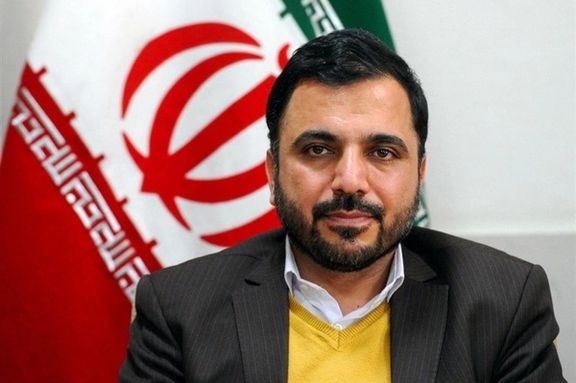
Iran’s minister of communications says in the current situation, he is not in favor unblocking social media platforms such as Telegram, WhatsApp, and Instagram.
This is the first time Issa Zarepour has openly revealed his opposition to removing the restriction on the popular platforms imposed last year after anti-regime protests broke out.
“I am not a decision-maker in this regard; it depends on different conditions... We are looking to empower domestic companies in virtual space,” he said on the sidelines of Eid-ul Fitr prayers on Saturday.
Last week, in a meeting with student activists, President Ebrahim Raisi said that foreign social media would be unblocked if they establish offices in Iran.
The Iranian parliament approved the general outline of a bill last year to restrict internet and access to various apps and platforms. The bill is ironically titled Legislation to Protect Cyberspace Users’ Rights.
The law requires foreign and domestic social-media networks and messaging applications to register with a regulatory and supervisory board that includes representatives of the intelligence ministry and the Revolutionary Guards intelligence organization.
In February, the former head of the Iranian Revolutionary Guard's intelligence and adviser to its commander also said that the internet has to be restricted because the "enemy" controls it.
Hossein Ta’eb stated that a "hybrid war" is taking place today instead of “bombings and missiles.”
Thousands of websites have been blocked for the past two decades, but after protests last year, the regime expanded its Internet restrictions.
An overwhelming majority of Iranians routinely use circumvention software to go around government blockages.
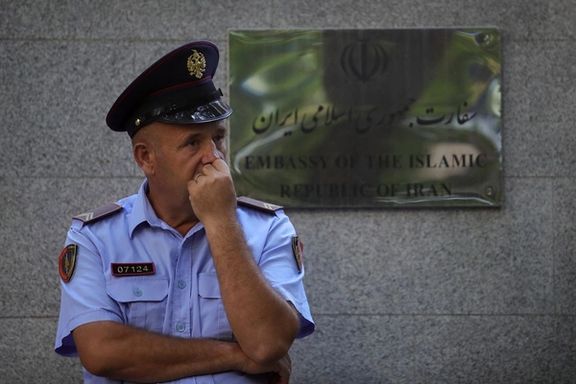
Iran's foreign minister says an Iranian interest section will be opened in Albania through Turkey in the absence of diplomatic relations with Tirana.
Hossein Amir-Abdollahian revealed Saturday that the Iranian foreign ministry has agreed to open a section in Albania for Iranian interests through Turkey.
According to IRNA state news agency, as part of a phone call with his Turkish counterpart, Mevlut Cavusoglu, Amir-Abdollahian also thanked the Turkish government for its support in this regard.
Albania terminated its diplomatic relations with Iran in September last September accusing the Islamic Republic of launching cyber-attacks against the country's infrastructure.
Relations between Albania and Iran have been strained for years due to the European country's hosting of the opposition group Mojahedin-e Khalq (MEK) Organization.
Tirana accused Tehran of carrying out a cyber-attack against Albanian institutions to "paralyze public services and hack data and electronic communications of government systems".
"This extreme response ... is fully proportionate to the gravity and risk of the cyberattack that threatened to paralyze public services, erase digital systems and hack into state records, steal government intranet electronic communication and stir chaos and insecurity in the country," stated Albanian Prime Minister Edi Rama.
The attack happened around the time of a MEK conference. In early August, cybersecurity firm Mandiant expressed “moderate confidence” that the attackers were acting in support of Tehran’s efforts to disrupt the MEK conference.
The July 23-24 conference by the dissident group, titled The Free Iran World Summit, was canceled following warnings from local authorities of a possible terrorist threat. Several US lawmakers were also among the invitees.
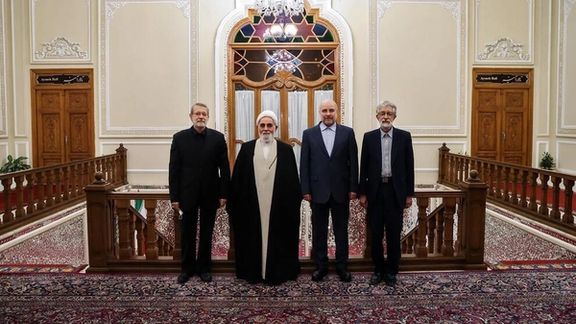
A meeting between four conservative heavyweights in Tehran has led to speculations about possible dealings ahead of the next parliamentary elections in March 2024.
The meeting which was a nocturnal fast-breaking party during the last week of Ramadan, was attended by the incumbent speaker of the Iranian parliament (Majles) Mohammad Bagher Ghalibaf, who calls himself a neo-con, and his predecessors, Ali Larijani, a moderate conservative politician, ultraconservative Gholam Ali Haddad Adel, whose political stances are aligned with the Paydari Party, and Ali Akbar Nateq-Nouri, another moderate conservative who was once very close to Supreme Leader Ali Khamenei and served as his chief inspector for several years until 2017.
The meeting was called for by Ghalibaf and was held in his office and is generally believed to have been about the outlook of the parliamentary elections and the challenges facing Iran's conservatives. Interestingly, all four men were presidential candidates in different years.
Some Iranian media including the moderate conservative Khabar Online suspect that the meeting was aimed at coming to some sort of arrangement between various conservative groups, in the absence of other political groups including the reformists who have been barred from taking part in elections in Iran at least since 2020.
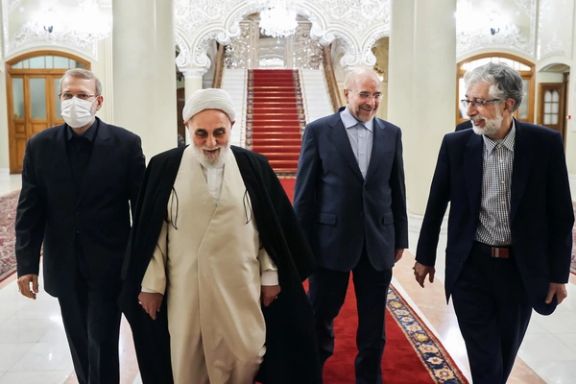
From among the four, Ali Larijani was the only one who told reporters that the meeting did not have any political agenda. Others remained silent.
The IRGC-linked newspaper Javan opined that the speculations about the meeting are the outcome of Iranian reformists' conspiracies. According to Javan, one of the leaders of the reformists has advised his likeminded politicians that "When your political rivals are moving toward some sort of accord, try to magnify their points of differences. Then, without any intervention just sit there and watch them fight and whenever there is a truce, you try to flare up the dispute.”
In the current round of the Majles, Ghalibaf has managed to garner support for his speakership from among the members of Paydari and the Conservatives Coalition Council, a group directly under the supervision of Haddad Adel who also has some influence in Paydari.
Haddad Adel on the other hand, who has helped Ghalibaf to win his role in the Majles, had pushed Ghalibaf aside in the 2017 Presidential election to pave the way for Raisi's victory, but Raisi lost that election to Hassan Rouhani. Nonetheless, the outcome of Haddad Adel's manoeuvres was creating the hegemony of hardliners in all three branches of the government.
The result for the country was the weakening of the Majles, which lost its supervisory power by being committed to support the hardliner government under any circumstances. Ghalibaf's attempts to stop impeachment motions to change cabinet ministers dramatically reduced the motivation of younger politicians to run for a Majles that no longer has a part in running the affairs of the state, Khabar Online wrote.
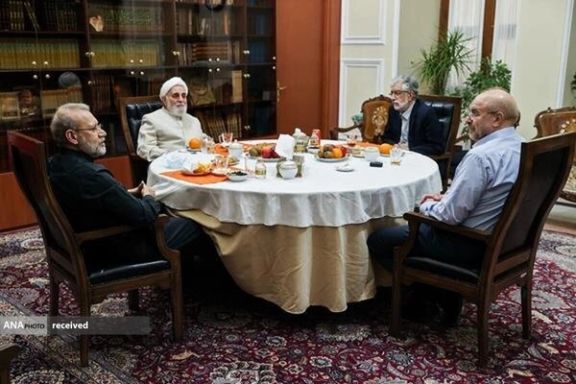
Political observers’ take on the issue is that if the next Majles, like the current one, fails to remain independent of the government, this will eventually turn the voters away from any election.
Khabar Online even opined that although there is some sort of tactical alliance between Ghalibaf and Haddad Adel, both relatives of Khamenei, they are unlikely to garner support from Larijani and Nateq-Nouri.
To further undermine the significance of the meeting of the four former presidential candidates, Lawmaker Jalal Mahmoudzadeh told reporters sarcastically that some of those in Raisi's cabinet were also presidential candidates, and you see how they are running the country and what does the country's economy look like under their management.